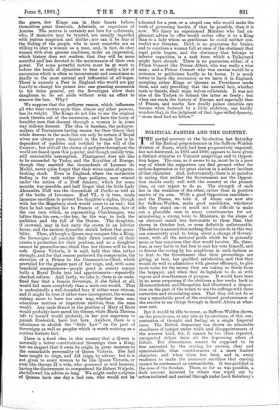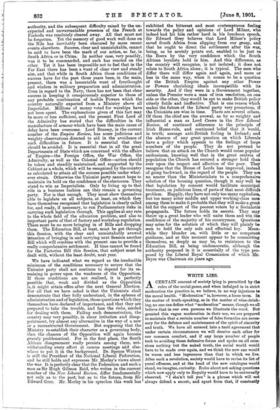POLITICAL PARTIES AND THE COUNTRY. T HE partial recovery at the
by-election last Saturday of the Radical preponderance in the Saffron-Walden division of Essex, which had been progressively impaired, but not destroyed, in 1895 and 1900, appears to have given a distinct stimulus to Unionist misgivings and to Opposi- tion hopes. The case, as it seems to US, must be in a poor way of which the supporters can find ground either for serious depression or for great elation in a solitary incident of that character. And, unfortunately, there is no paradox in saying that neither the Government nor the Opposi- tion stands really well with the country at the present time, or can expect to do so. The strength of each lies in the weakness of the other, rather than in positive merits of its own. With a good Opposition candidate— and. the Peases, we take it, of whom one now sits for Saffron-Walden, make good candidates, whichever side they stand on—it could not be difficult to make out a plausible case in many constituencies for ad- ministering a strong tonic to Ministers, in the shape of an electoral result less favourable to them than that shown in October last, or even definitely unfavourable. The elector is assured that nothing that he can do in this way can conceivably avail to bring about a change of Govern- ment, with all the national perils which he is generally more or less conscious that that would involve. He, there- fore, is very liable to feel free to cast his vote himself, and to favour the voting by his neighbour, in such fashion as to hint to the Government that their proceedings are giving, at best, but qualified satisfaction, and that they would do well to administer with greater efficiency, to give more value for the money they are taking so freely from the taxpayer, and when they do legislate to do so with vigour and steadfastness of purpose. It would have been in no sense surprising if the elections a few weeks back in Monmouthshire and Shropshire had illustrated a disposi- tion on the part of the voters to use the suffrage with these corrective and stimulating aims. That they did not do so was a remarkable proof of the continued predominance of the resolve to see things through in South Africa at what- ever cost.
But it would be idle to count, as Saffron-Walden shows, on the persistence, at any rate at by-elections, of this con- centration of thought and feeling on a single Imperial issue. The British democracy has shown an admirable steadiness of temper under trials and disappointments of the severest kind, for, it cannot be too often repeated, unexpected delays have all the depressing effect of failure. But democracies cannot be supposed to be less animated by the craving for success, clear and. unmistakable, than constituencies of a more limited character, and when there has been, and is, every readiness to make the necessary sacrifices that craving cannot be condemned as unreasonable. It was gratified in the case of the Soudan. There, so far as was possible, a dark account incurred by others was wiped out by action initiated and carried through under Lord Salisbury's authority, and the subsequent difficulty raised by the Un- expected and unwarrantable presenceof the French at Fashoda was resolutely away. All that must not be forgotten. Yet the memory of good work well done on the Nile has inevitably been obscured by more recent events elsewhere. Success, clear and unmistakable, cannot be said to have been the mark of our action, so far, in Seuth Africa or in China. In neither case, very possibly, was it to be commanded, and each has reacted on the other. Yet it has been' impossible not to feel that in the Far East there has been a want of clear view and steady aim, and that while in South Africa those conditions of success have for the past three years been, in the main, present, there was a lamentable want of forethought and wisdom in military preparation and administration. Even in regard to the Navy, there has not been that clear success in keeping it conspicuously superior to those of any probable combination of hostile Powers which the country naturally expected from a Ministry above all Imperialist. Millions of money voted for warships have not been spent. The explanations given of this fact may be more or less sufficient, and the present First Lord of the Admiralty has stated that the difficulties in the manufacture of armour which have been the main cause of delay have been overcome. Lord Brassey, in the current number of the Empire Review, has some judicious and weighty observations directed to aid in the avoidance of such difficulties in future. It is essential that they should be avoided. It is essential that in all the great Departments of State which are concerned with the affairs of Empire—the Foreign Office, the War Office, the Admiralty, as well as the Colonial Office—action should be taken and steadily maintained, and supported by the Cabinet as a whole, which will be recognised by the country as calculated to attain all the success possible under what- ever strain. Otherwise the Unionist party cannot hope to maintain its hold on the confidence of the electorate. They stand to win as Imperialists. Only by living up to that role in a business fashion can they remain a governing party. Nor is that enough. They must show themselves able to legislate on all subjects, at least, on which they have themselves recognised that legislation is clearly called for, and ready, if necessary, to ran Parliamentary risks in carrying such legislation through. This applies at any rate to the whole field of the education problem, and a_so to important parts of that of factory and workshop regulation. There must be no more bringing in of Bills and dropping them. The Education Bill, at least, must be got through this Session, with the clear and unmistakably avowed intention of bringing in and carrying next Session another Bill which will combine with the present one to provide a really comprehensive settlement. If time cannot be found for the Factories Bill this Session, that subject must be dealt with, without the least doubt, next year.
We have indicated what we regard as the irreducible minimum of the conditions necessary to secure that the Unionist party shall not continue to depend for its re- maining in power upon the weakness of the Opposition. If those conditions are not realised, it is perfectly possible that, weak and divided as the Opposition is, it might attain office after the neat General Election For all that we have asked is that the Unionists shall demonstrate that they fully understand, in the spheres of administration and of legislation, those questions which they themselves have declared of importance, and that they are prepared to take the trouble, and face the risks, needed for dealing with them. Failing such demonstration, the country may very possibly, in sheer irritation and disap- pointment, try almost any alternative in the way of a new or a reconstructed Government. But supposing that the Ministry re-establish their character as a governing body, then the chances of the Opposition will again become gravely problematical. For in the first place, the South African disagreement really persists among them, not- withstanding every effort at caucus meetings and else- where to put it in the background. Dr. Spence Watson is still the President of the National Liberal Federation, and he still holds and expresses Mr. Morley's views about the war. It is perfectly clear that the Federation and such a man as Sir Hugh Gilzean Reid, who writes in the current number of the New Liberal Review, differ fundamentally not only as to the past, but as to the future, from Sir Edward Grey. Mr. Morley in his speeches this week has exhibited the bitterest and most contemptuous feeling towards the policy and opinions • of Lord. Milner, who indeed had hit him rather hard in his luncheon speech. Sir Edward Grey believes that Lord Milner's policy saved South Africa from slipping from our grasp, and that he ought to direct the settlement after the war, being, as he acutely points out, enabled to be just to the Boers by the very confidence which the South African loyalists hold in him. And this difference, as the country will recognise, is not isolated; it does not relate to South Africa alone; it is typical. The men who differ there will differ again and again, and more or less in the same way, when it comes to be a question of the British Empire against any other Power or Powers cherishing ideals incompatible with its security. And if they were in a Government together, unless the Premier were a man of iron resolution, on one side or the other, they would be apt to make British policy utterly futile and ineffective. That is one reason which makes the future of the Liberal party very precarious, if the Unionists are wise in time. There are several others. Of them the chief are the avowal, as by so weighty and influential a man as Lord Crewe in the New Liberal Review, of continued adherence to the principle of Irish Home-rule, and continued belief that it would, in truth: assuage anti-British feeling in Ireland; and the absence of any great question on which Liberals have a policy which appeals to the feelings of large numbers of the people. They do not pretend to believe that an attack on the Church would rouse popular enthusiasm, blowing well that in the great centres of population the Church has secured a stronger hold than ever upon the respect and affection of the poor. They recognise that the House of Lords has improved, instead of going backward,, in the regard of the people. They are no nearer than the Ministerialists to a comprehensive solution of the housing question, though it may well be that legislation by consent would facilitate municipal treatment, on judicious lines, of parts of that most difficult problem. Happily, they have not only too many capitalists, but too many sober middle and upper working-class men among them to make it probable that they will make a great bid for the support of the poorest voters by a' Socialistic propaganda. The future holds its secrets. They may throw up a great leader who will unite them and win the confidence of the majority of his countrymen. Questions may arise for the solution of which they will plainly be seen to hold the only safe and effectual key. Mean- while they blunder on, with little or no competent guidance, and at this moment appear to be committing themselves, as deeply as may be, to resistance to the Education Bill, as being undemocratic, although the authority proposed in it is essentially of the type pro- posed by the Liberal Royal Commission of which Mr. Bryce was Chairman six years ago.







































 Previous page
Previous page